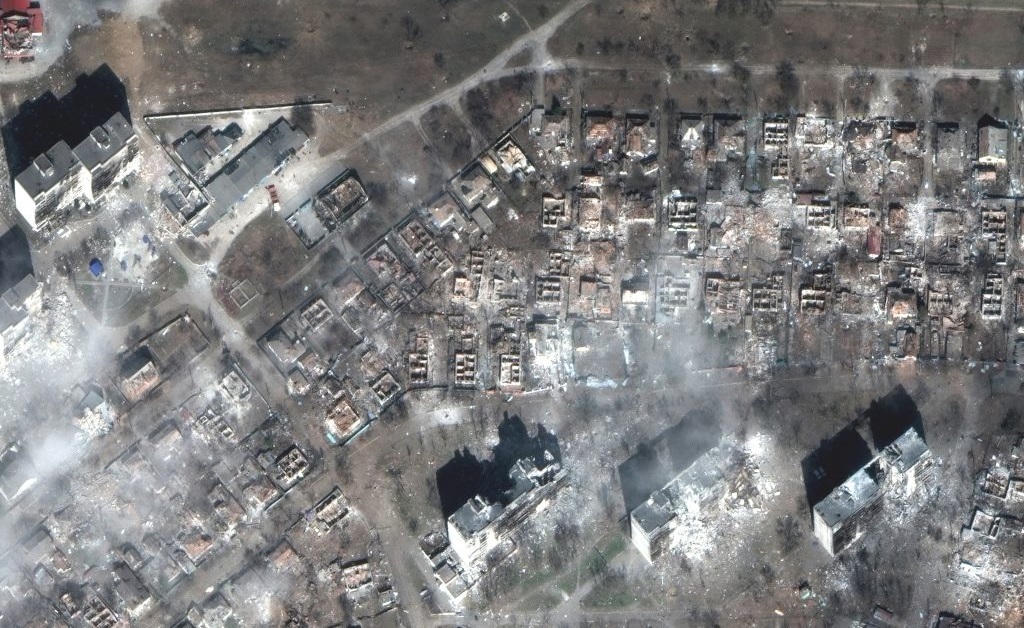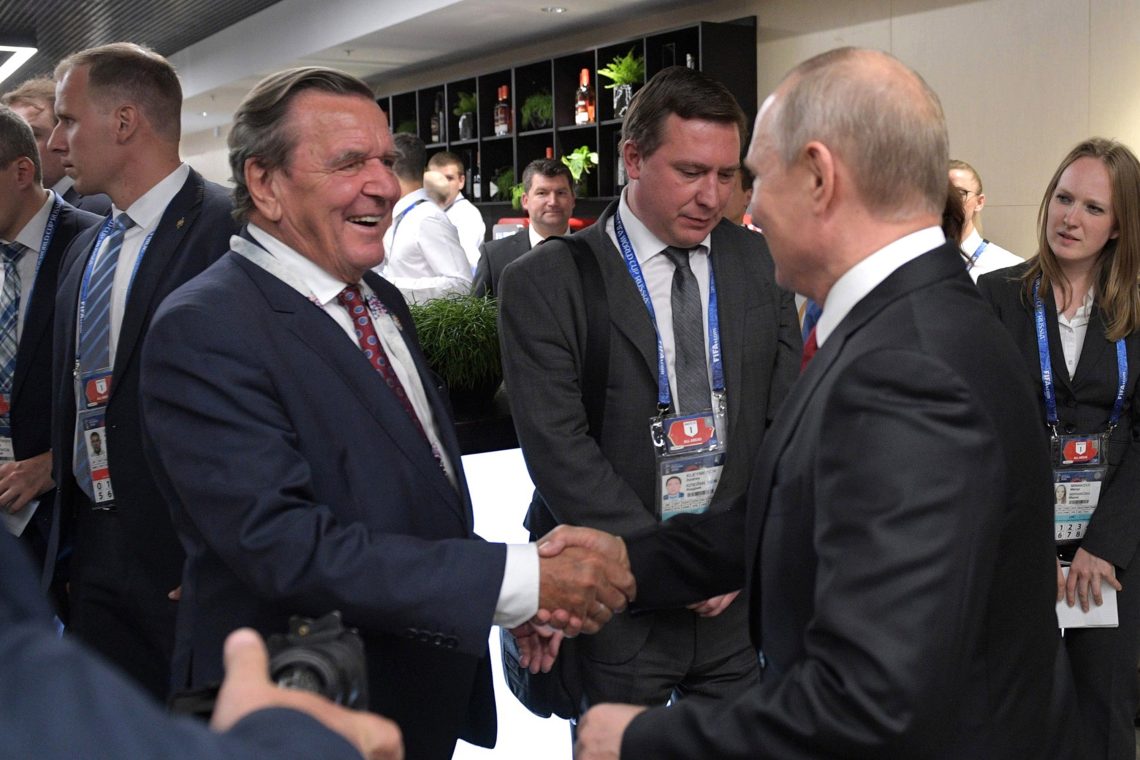Values vs. spheres of influence
The war in Ukraine has exposed the moral divide between the West and Russia. The Kremlin believes in spheres of influence backed by military power. The West has no hope of success unless it steels itself for the hard realities ahead.

In a nutshell
- Russia and the West do not play the same game
- Russia’s values are fundamentally different from those of the West
- Europe must unite to confront Russian aggression
The horrors of the Russian invasion of Ukraine shine an unforgiving light on what has long been the cardinal sin of Western foreign and security policy. With the end of the Cold War, and the implosion of the Soviet Union, a new generation of experts and policymakers jettisoned old-style realpolitik and instead became obsessed with modernistic value promotion.
The implication was that the days of the “cold warriors,” who believed in hard security, were over. Ronald Reagan’s characterization of the Soviet Union as an “Evil Empire,” and his ambitions to counter evil with hard power, were described in derogatory terms. In the brave new world, Russia would be transformed into a liberal democracy and a rules-based market economy.
What is now becoming tragically clear is that this did not happen, and probably never stood much of a chance of happening. The main lesson from the tragedy in Ukraine is that Russia and the West have simply not been playing the same game. While the West has been obsessed with transforming the countries of the world into copies of itself, Russia has remained mired in the Cold War perceptions of spheres of interest. And of late, Russia has not been shy about emphatically emphasizing that its values are fundamentally different from those of the West.
These two contrasting world views may be referred to as Yalta versus Helsinki. It was at Yalta on the Crimea in February 1945 that the leaders of the Big Three world powers – Josef Stalin, Franklin D. Roosevelt and Winston Churchill – met to agree on postwar spheres of interest. They moved borders and traded the fates of small countries among themselves, much as the 19th-century colonial powers had created states and moved borders in Africa.
President Putin’s values
Russian President Vladimir Putin has provided ample evidence that he remains convinced that this is the way international relations should be managed, and indeed still are managed, only without Russian participation. Mr. Putin’s aggression against Ukraine is the culmination of a long period of mounting frustration that he has not been allowed a place at the table with the big powers.
The core of the Western belief in value promotion and soft power may in stark contrast be derived from the Helsinki Final Act, the conclusion of deliberations within the Conference on Security and Co-operation in Europe that were held in Helsinki in 1975. The outcome was that the Soviet leadership accepted to honor human rights in return for recognition of the borders it had created in Europe, subsequently characterized by Winston Churchill as the Iron Curtain. The most important result of the Helsinki Accords was the creation of the Organization for Security and Co-operation in Europe (OSCE).
The only countries that (to date) have been kept safe from Russian aggression are those that have been protected by the hard power of NATO.
In the period after the conclusion of the Cold War, the European powers have been obsessed with the assumed potential of the OSCE to resolve conflicts with soft power. The reason is that this has been the one arena where European leaders have been able to sit at the same table with Russian leaders. The outcome has been universal failure, from Georgia to Nagorno-Karabakh and Ukraine. The only countries that (to date) have been kept safe from Russian aggression are those that have been protected by the hard power of NATO.
The reason why the beliefs in the OSCE and in soft power have ended in such abysmal failures is that the two world views are so fundamentally incompatible. Since values are, by definition, without limits, there has been no way for the two sides to come together. While Western policymakers have been firmly convinced that their soft power would transform Russia, the Kremlin has been equally convinced that it is all a ruse, a camouflage for a sinister ambition to break Russia. Mr. Putin very clearly views the promotion of values as nothing short of an existential threat to his regime.

The West’s values
While this may seem obvious today, until very recently the Western powers remained convinced that their understanding of Western values as universal values would prevail. Lavishly funded programs of democracy assistance would ensure that all countries in the world would become Westernized.
While the United States was pursuing its program of orchestrating regime change across the Arab world, with horrific consequences, the European Union laid down a challenge to Russia, seeking to extend its values deep into the Kremlin’s sphere of interest. It was defined as a contest between the Kremlin’s perception of a “near abroad” and Brussel’s vision of an Eastern Partnership. The key states were Georgia and Ukraine, which desperately wanted membership in NATO, but also Armenia, Azerbaijan, Belarus and Moldova.
The noble mantra that was repeated throughout the process was that all countries have a right to choose for themselves what alliances and partnerships they wish to join, and that this is none of Russia’s business. What nobody seems to have been ready to even contemplate was that a day might come when Russia decided to resolve the issue with brute military force.
There had been ample warnings that the Kremlin would stand ready to enforce its sphere of interest with hard power. Mr. Putin’s chilling speech at the Munich Security Conference on February 10, 2007, was viewed at the time as rather bizarre. The strong performance of the Russian economy, operating on steroids from hydrocarbon revenues, was viewed as so promising that his increasing authoritarianism could be shrugged off as “democratic backsliding.” In December 2007, Time magazine featured him on its cover as Person of the Year. Fifteen years later, the Munich speech may be remembered as a wake-up call that everybody overslept.
Indulging Mr. Putin
Although the Kremlin’s intentions to enforce its sphere of interest were confirmed with the invasion of Georgia in 2008 and with the invasion of Ukraine in 2014, the message still did not resonate. The EU remained beholden to its belief in soft power. The illegal annexation of Crimea was grudgingly accepted, as was the insurgency in Donbas and even the shooting down of Malaysia Airlines Flight 17, killing all 298 people aboard.
In retrospect, the Minsk agreements may be viewed as a modern-day version of the Munich Agreement.
The ambition was that the conflict must be determined with soft power, and the price to be paid for ensuring that Mr. Putin would take part was to accept his blatant lies about not being involved in support for the insurgency in Donbas. The lengthy process of negotiations that has now ended in a terrible war was pursued within the OSCE and led by Germany and France in the “Normandy Format.” The basis for the negotiations was the Minsk agreements: a deal that Russia could accept, and that Ukraine claims it was forced to sign with a gun to its head.
In retrospect, the Minsk agreements may be viewed as a modern-day version of the Munich Agreement, that shameful day in September 1938 when Neville Chamberlain sold out Czechoslovakia to appease Hitler. It may be useful to recall Winston Churchill’s caustic comment: “You were given the choice between war and dishonor. You chose dishonor and you will have war.” Now the Western powers have again accepted dishonor and are faced with war, the consequences of which are mind-boggling.
Scenarios
Less likely
The outlook can only be viewed as grim. It is possible to construct an optimistic scenario where Western value promotion has been sufficiently influential to convince a large part of the Russian population that the war must end, that links with the West must be resuscitated, and that Mr. Putin must go. The link would be via a collapse of the morale of the armed forces, as families begin receiving caskets with dead sons and news of the atrocities committed against Ukrainians that are officially claimed to be the same people as the Russians.
The ongoing campaign to hunt down the assets of Russian oligarchs will probably not have much effect. It may satisfy Western moral imperatives to take revenge, which is legitimate, but the oligarchs’ links to and influence over Mr. Putin have probably been reduced to a very low order of probability. What President Putin should and probably does fear is an insurrection from inside the armed forces, perhaps as a war between the regular army and the internal security forces. This could see Mr. Putin end up being killed in a storm drain, like Muammar Qaddafi.
More likely
The regrettably more likely scenario is that the process of death and destruction continues to escalate, by way of missile strikes against civilian structures. This faces the Western powers with an immediate need to fundamentally rethink their belief in soft power. And that will be much easier said than done.
The case of Germany offers a sordid illustration of how addiction to appeasement and pacifism has placed the largest of the European economies in a situation of deeply disturbing dependence on Russia. Most important is that the addiction to Russian gas has been allowed to continue growing, despite numerous warnings from the U.S.
Washington tried to discourage Berlin from accepting the first major Soviet-era gas project, but German Ostpolitik prevailed. It then tried to discourage Germany from joining the Nord Stream I project, but Chancellor Gerhard Schroeder shrugged it off, calling Vladimir Putin a “dyed-in-the-wool” democrat and proceeding to be lavishly rewarded by Gazprom. Finally, Washington waged a hard battle to stop Nord Stream II, but Chancellor Angela Merkel insisted until the end of her tenure that it was purely commercial and must not be questioned.
Ms. Merkel also took steps to exacerbate the dependence on Russia by launching the Energiewende, the decision to phase out nuclear power that has now been almost completed. German dependence on Russian gas is now so critical that Berlin has refused to agree to a full exclusion of Russia from SWIFT. It won an exception to be able to pay for Russian gas, thus eroding the power of the package.
To this may be added that the Bundeswehr is today in such a deplorable state that even a massive increase in funding, which has been promised by Chancellor Olaf Scholtz, will not make much of a difference in the short term.
The main message from the ever-tighter relations between Moscow and Beijing is that the game of spheres of interest is becoming the dominant one. It will be a combat between spheres of interest that are based on fundamentally different civilizational values. The outlook for the European Union to come to terms with this transformation is not made any brighter by the fact that Brussels is involved in waging harsh battles against member states like Poland and Hungary that it claims to fall short on “European values.” If Europe cannot even agree to terminate its own civil war over values, then the outlook for it to be able to face up to Russian aggression does look rather bleak.







